Analyzing the Future of Independent Travel Agencies in London, UK
VerifiedAdded on 2019/12/03
|27
|7754
|382
Report
AI Summary
This report investigates the future of independent travel agencies in London, focusing on the next five years. It begins with an overview of the travel and tourism industry, highlighting the impact of technology, globalization, and changing consumer behaviors. The report examines the role and importance of travel agencies, current market trends, and the challenges faced by independent agencies, including competition from online travel agencies and larger tour operators. The methodology includes literature review, research questions, and a qualitative research approach involving data collection from primary and secondary sources. Findings from data analysis, including thematic analysis of interview data, are presented, followed by conclusions and recommendations for independent travel agencies to regain market position and enhance their business. The report also includes a reflective statement and references.
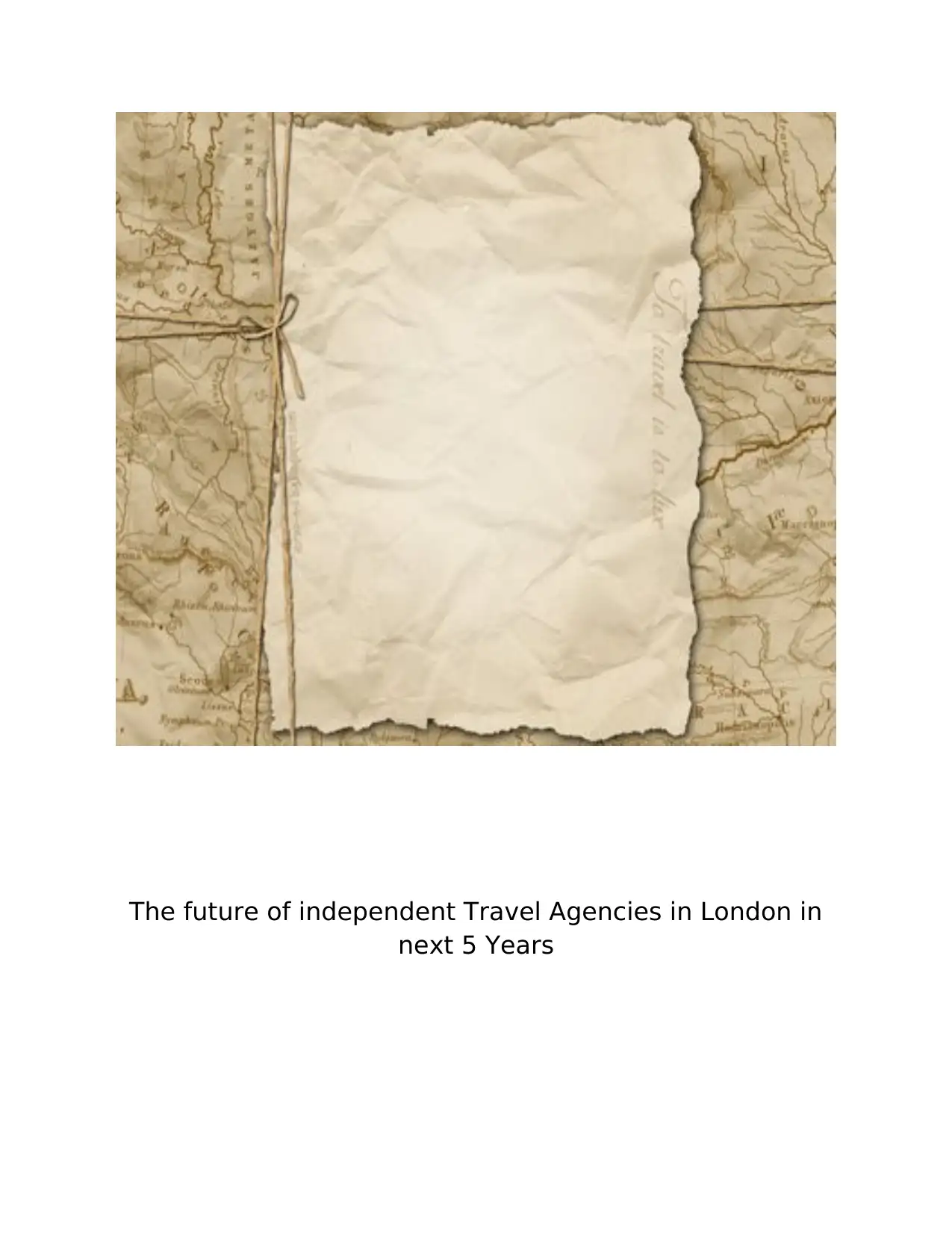
The future of independent Travel Agencies in London in
next 5 Years
next 5 Years
Paraphrase This Document
Need a fresh take? Get an instant paraphrase of this document with our AI Paraphraser
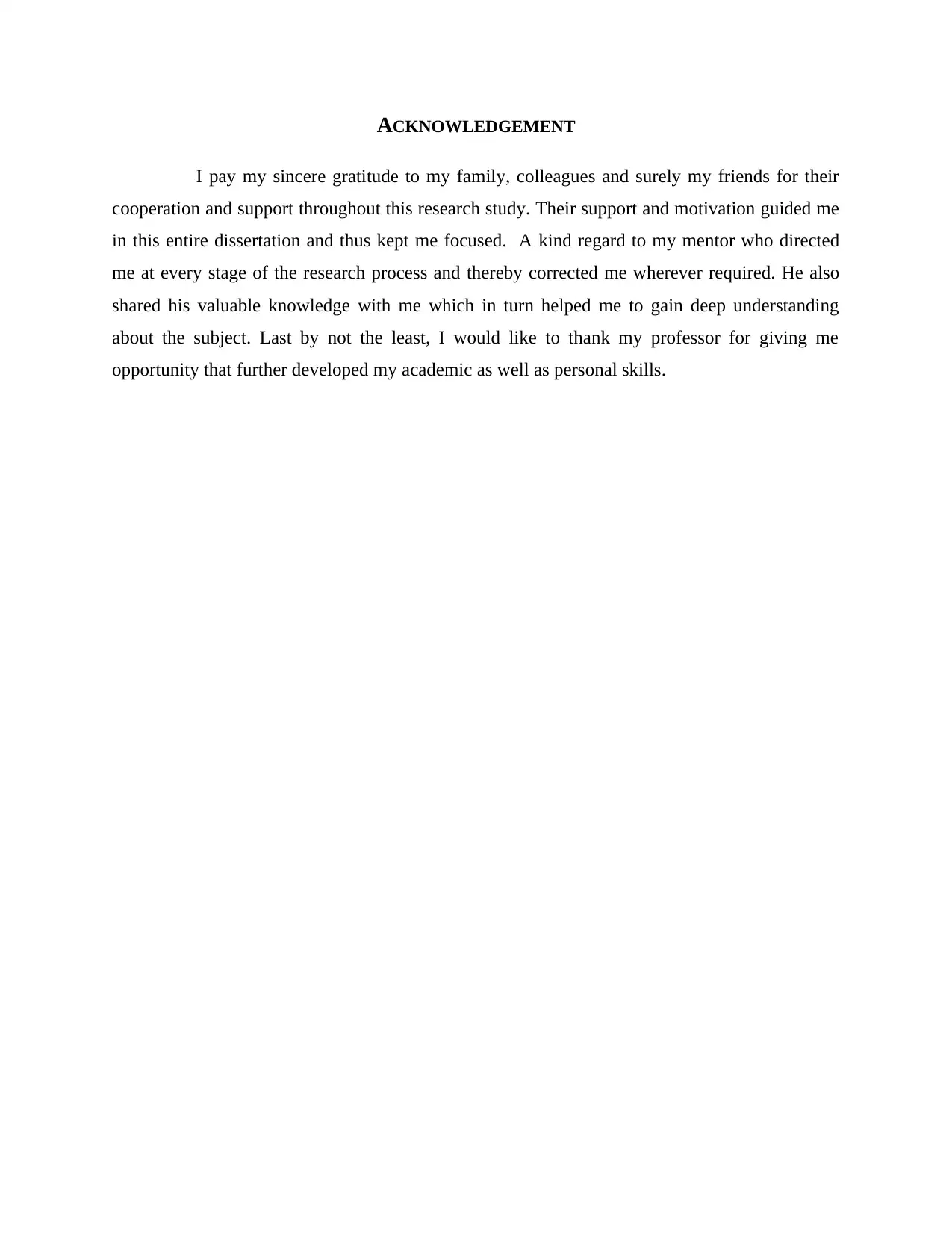
ACKNOWLEDGEMENT
I pay my sincere gratitude to my family, colleagues and surely my friends for their
cooperation and support throughout this research study. Their support and motivation guided me
in this entire dissertation and thus kept me focused. A kind regard to my mentor who directed
me at every stage of the research process and thereby corrected me wherever required. He also
shared his valuable knowledge with me which in turn helped me to gain deep understanding
about the subject. Last by not the least, I would like to thank my professor for giving me
opportunity that further developed my academic as well as personal skills.
I pay my sincere gratitude to my family, colleagues and surely my friends for their
cooperation and support throughout this research study. Their support and motivation guided me
in this entire dissertation and thus kept me focused. A kind regard to my mentor who directed
me at every stage of the research process and thereby corrected me wherever required. He also
shared his valuable knowledge with me which in turn helped me to gain deep understanding
about the subject. Last by not the least, I would like to thank my professor for giving me
opportunity that further developed my academic as well as personal skills.
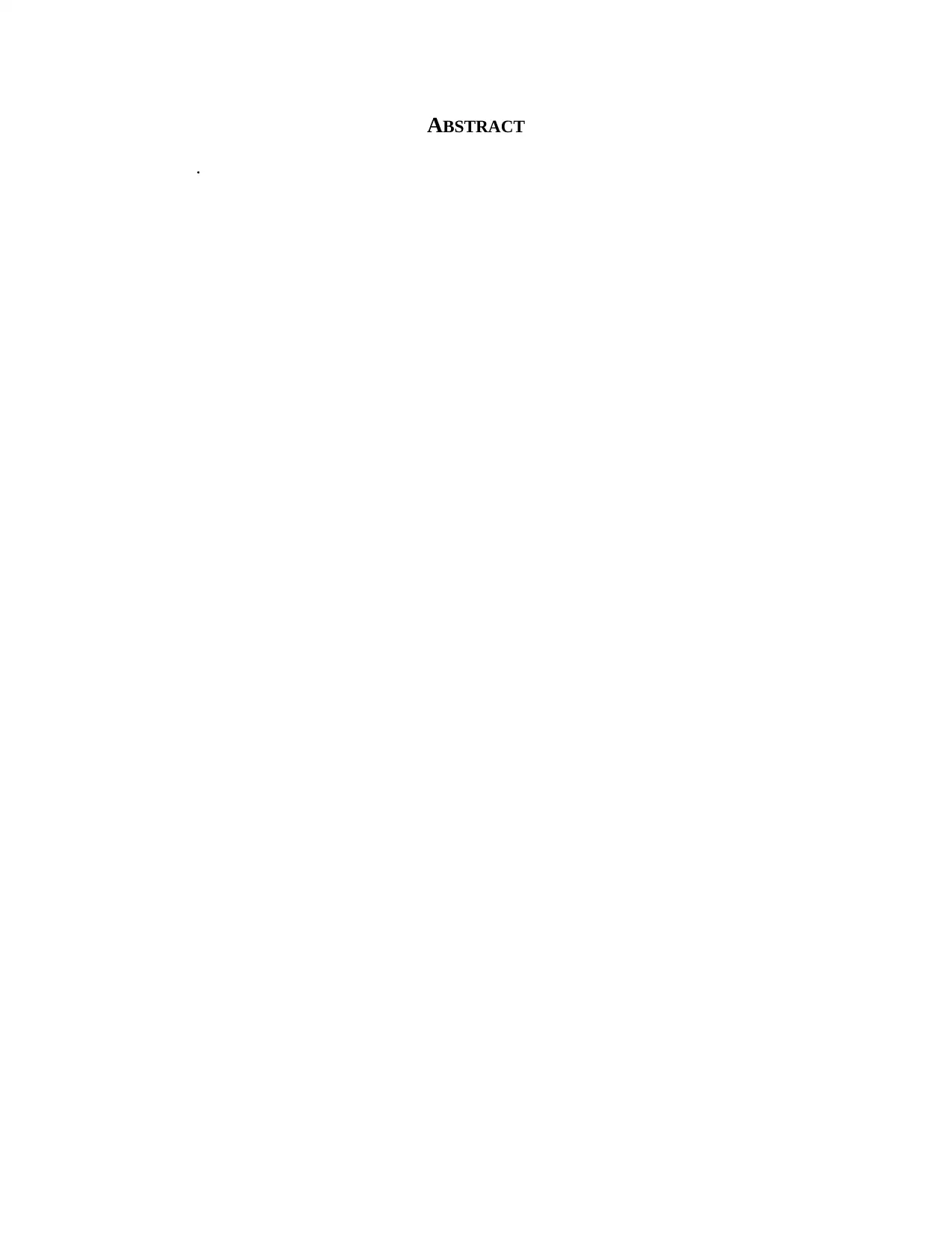
ABSTRACT
.
.
⊘ This is a preview!⊘
Do you want full access?
Subscribe today to unlock all pages.

Trusted by 1+ million students worldwide
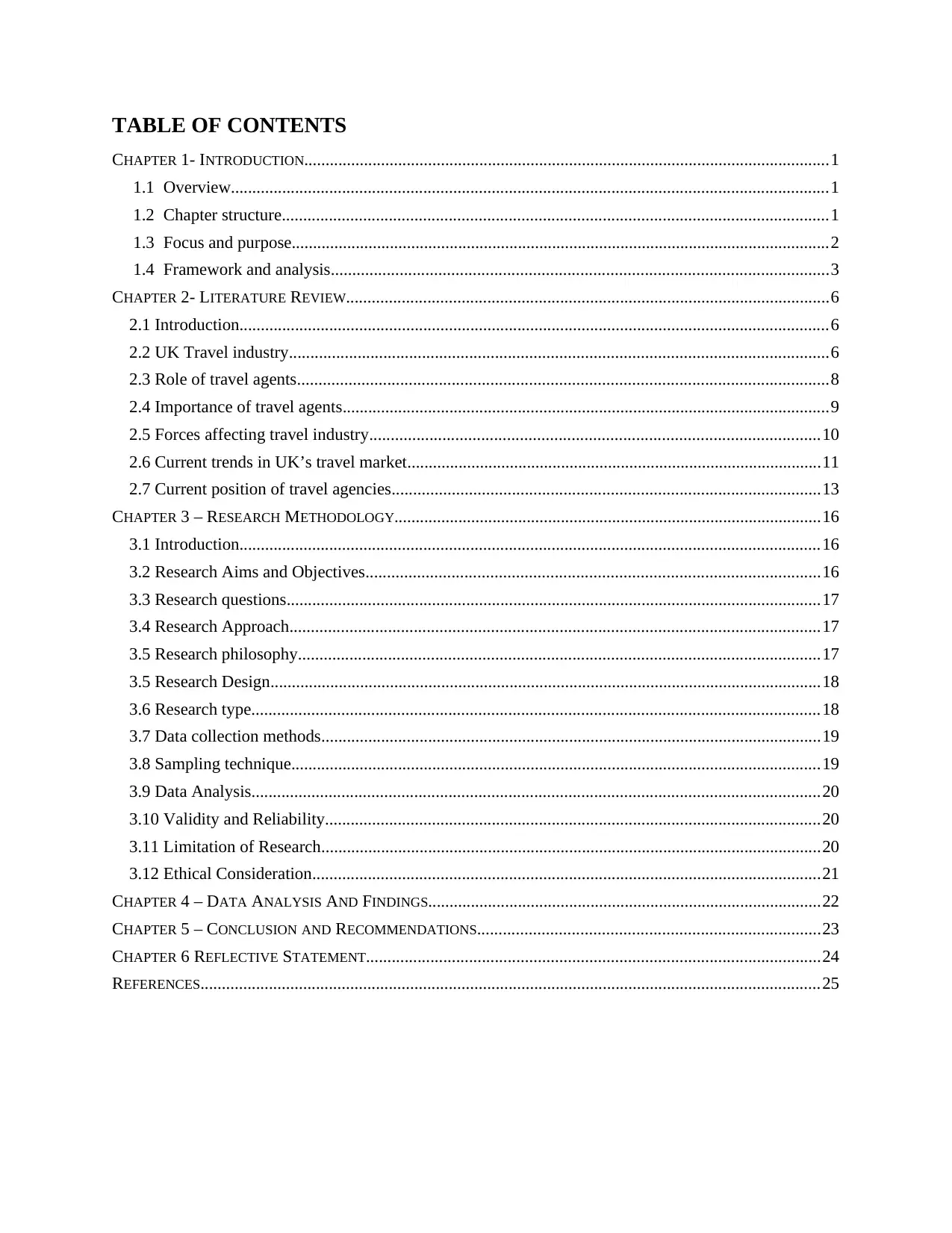
TABLE OF CONTENTS
CHAPTER 1- INTRODUCTION...........................................................................................................................1
1.1 Overview............................................................................................................................................1
1.2 Chapter structure................................................................................................................................1
1.3 Focus and purpose..............................................................................................................................2
1.4 Framework and analysis....................................................................................................................3
CHAPTER 2- LITERATURE REVIEW.................................................................................................................6
2.1 Introduction..........................................................................................................................................6
2.2 UK Travel industry..............................................................................................................................6
2.3 Role of travel agents............................................................................................................................8
2.4 Importance of travel agents..................................................................................................................9
2.5 Forces affecting travel industry.........................................................................................................10
2.6 Current trends in UK’s travel market.................................................................................................11
2.7 Current position of travel agencies....................................................................................................13
CHAPTER 3 – RESEARCH METHODOLOGY....................................................................................................16
3.1 Introduction........................................................................................................................................16
3.2 Research Aims and Objectives..........................................................................................................16
3.3 Research questions.............................................................................................................................17
3.4 Research Approach............................................................................................................................17
3.5 Research philosophy..........................................................................................................................17
3.5 Research Design.................................................................................................................................18
3.6 Research type.....................................................................................................................................18
3.7 Data collection methods.....................................................................................................................19
3.8 Sampling technique............................................................................................................................19
3.9 Data Analysis.....................................................................................................................................20
3.10 Validity and Reliability....................................................................................................................20
3.11 Limitation of Research.....................................................................................................................20
3.12 Ethical Consideration.......................................................................................................................21
CHAPTER 4 – DATA ANALYSIS AND FINDINGS............................................................................................22
CHAPTER 5 – CONCLUSION AND RECOMMENDATIONS................................................................................23
CHAPTER 6 REFLECTIVE STATEMENT..........................................................................................................24
REFERENCES.................................................................................................................................................25
CHAPTER 1- INTRODUCTION...........................................................................................................................1
1.1 Overview............................................................................................................................................1
1.2 Chapter structure................................................................................................................................1
1.3 Focus and purpose..............................................................................................................................2
1.4 Framework and analysis....................................................................................................................3
CHAPTER 2- LITERATURE REVIEW.................................................................................................................6
2.1 Introduction..........................................................................................................................................6
2.2 UK Travel industry..............................................................................................................................6
2.3 Role of travel agents............................................................................................................................8
2.4 Importance of travel agents..................................................................................................................9
2.5 Forces affecting travel industry.........................................................................................................10
2.6 Current trends in UK’s travel market.................................................................................................11
2.7 Current position of travel agencies....................................................................................................13
CHAPTER 3 – RESEARCH METHODOLOGY....................................................................................................16
3.1 Introduction........................................................................................................................................16
3.2 Research Aims and Objectives..........................................................................................................16
3.3 Research questions.............................................................................................................................17
3.4 Research Approach............................................................................................................................17
3.5 Research philosophy..........................................................................................................................17
3.5 Research Design.................................................................................................................................18
3.6 Research type.....................................................................................................................................18
3.7 Data collection methods.....................................................................................................................19
3.8 Sampling technique............................................................................................................................19
3.9 Data Analysis.....................................................................................................................................20
3.10 Validity and Reliability....................................................................................................................20
3.11 Limitation of Research.....................................................................................................................20
3.12 Ethical Consideration.......................................................................................................................21
CHAPTER 4 – DATA ANALYSIS AND FINDINGS............................................................................................22
CHAPTER 5 – CONCLUSION AND RECOMMENDATIONS................................................................................23
CHAPTER 6 REFLECTIVE STATEMENT..........................................................................................................24
REFERENCES.................................................................................................................................................25
Paraphrase This Document
Need a fresh take? Get an instant paraphrase of this document with our AI Paraphraser
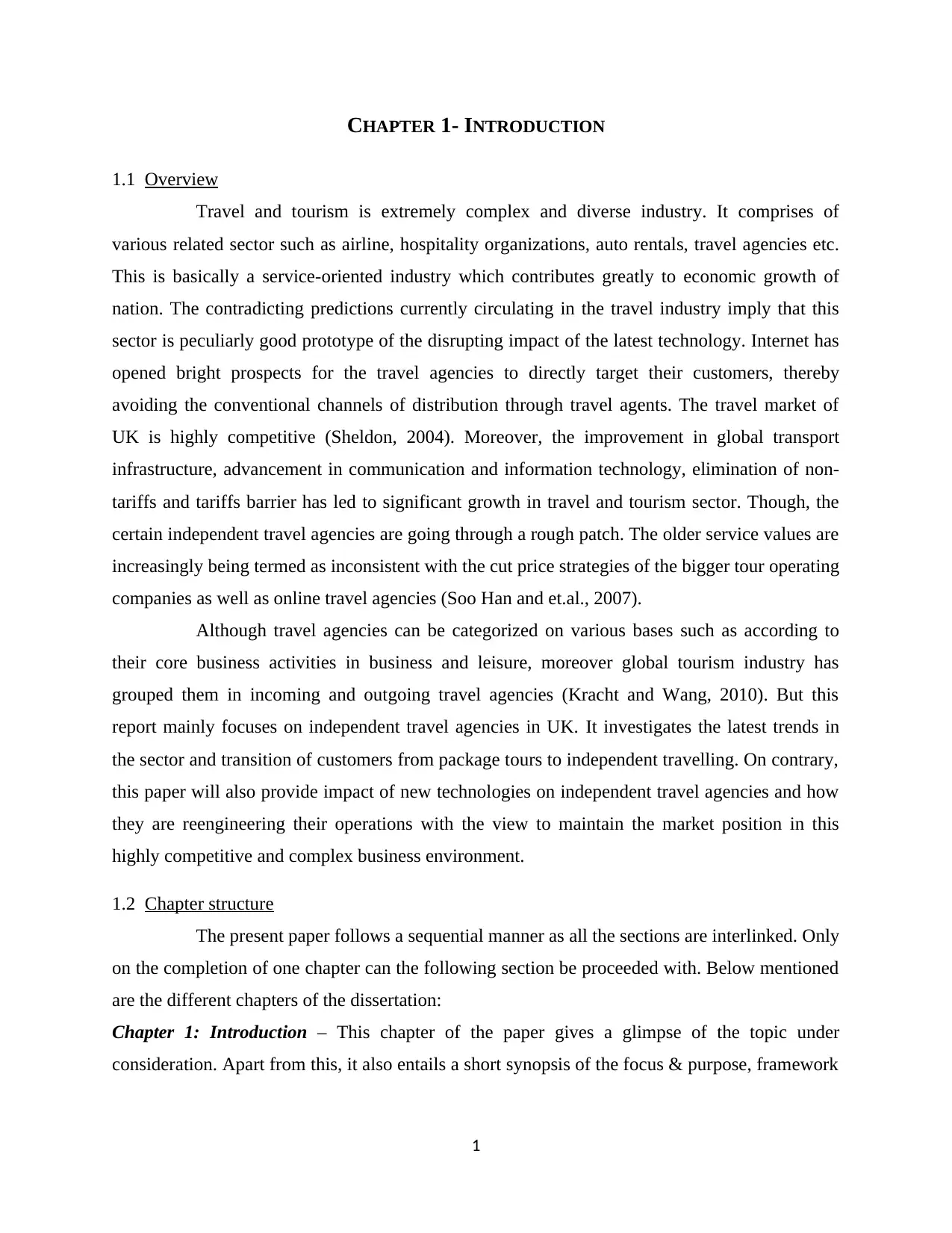
CHAPTER 1- INTRODUCTION
1.1 Overview
Travel and tourism is extremely complex and diverse industry. It comprises of
various related sector such as airline, hospitality organizations, auto rentals, travel agencies etc.
This is basically a service-oriented industry which contributes greatly to economic growth of
nation. The contradicting predictions currently circulating in the travel industry imply that this
sector is peculiarly good prototype of the disrupting impact of the latest technology. Internet has
opened bright prospects for the travel agencies to directly target their customers, thereby
avoiding the conventional channels of distribution through travel agents. The travel market of
UK is highly competitive (Sheldon, 2004). Moreover, the improvement in global transport
infrastructure, advancement in communication and information technology, elimination of non-
tariffs and tariffs barrier has led to significant growth in travel and tourism sector. Though, the
certain independent travel agencies are going through a rough patch. The older service values are
increasingly being termed as inconsistent with the cut price strategies of the bigger tour operating
companies as well as online travel agencies (Soo Han and et.al., 2007).
Although travel agencies can be categorized on various bases such as according to
their core business activities in business and leisure, moreover global tourism industry has
grouped them in incoming and outgoing travel agencies (Kracht and Wang, 2010). But this
report mainly focuses on independent travel agencies in UK. It investigates the latest trends in
the sector and transition of customers from package tours to independent travelling. On contrary,
this paper will also provide impact of new technologies on independent travel agencies and how
they are reengineering their operations with the view to maintain the market position in this
highly competitive and complex business environment.
1.2 Chapter structure
The present paper follows a sequential manner as all the sections are interlinked. Only
on the completion of one chapter can the following section be proceeded with. Below mentioned
are the different chapters of the dissertation:
Chapter 1: Introduction – This chapter of the paper gives a glimpse of the topic under
consideration. Apart from this, it also entails a short synopsis of the focus & purpose, framework
1
1.1 Overview
Travel and tourism is extremely complex and diverse industry. It comprises of
various related sector such as airline, hospitality organizations, auto rentals, travel agencies etc.
This is basically a service-oriented industry which contributes greatly to economic growth of
nation. The contradicting predictions currently circulating in the travel industry imply that this
sector is peculiarly good prototype of the disrupting impact of the latest technology. Internet has
opened bright prospects for the travel agencies to directly target their customers, thereby
avoiding the conventional channels of distribution through travel agents. The travel market of
UK is highly competitive (Sheldon, 2004). Moreover, the improvement in global transport
infrastructure, advancement in communication and information technology, elimination of non-
tariffs and tariffs barrier has led to significant growth in travel and tourism sector. Though, the
certain independent travel agencies are going through a rough patch. The older service values are
increasingly being termed as inconsistent with the cut price strategies of the bigger tour operating
companies as well as online travel agencies (Soo Han and et.al., 2007).
Although travel agencies can be categorized on various bases such as according to
their core business activities in business and leisure, moreover global tourism industry has
grouped them in incoming and outgoing travel agencies (Kracht and Wang, 2010). But this
report mainly focuses on independent travel agencies in UK. It investigates the latest trends in
the sector and transition of customers from package tours to independent travelling. On contrary,
this paper will also provide impact of new technologies on independent travel agencies and how
they are reengineering their operations with the view to maintain the market position in this
highly competitive and complex business environment.
1.2 Chapter structure
The present paper follows a sequential manner as all the sections are interlinked. Only
on the completion of one chapter can the following section be proceeded with. Below mentioned
are the different chapters of the dissertation:
Chapter 1: Introduction – This chapter of the paper gives a glimpse of the topic under
consideration. Apart from this, it also entails a short synopsis of the focus & purpose, framework
1
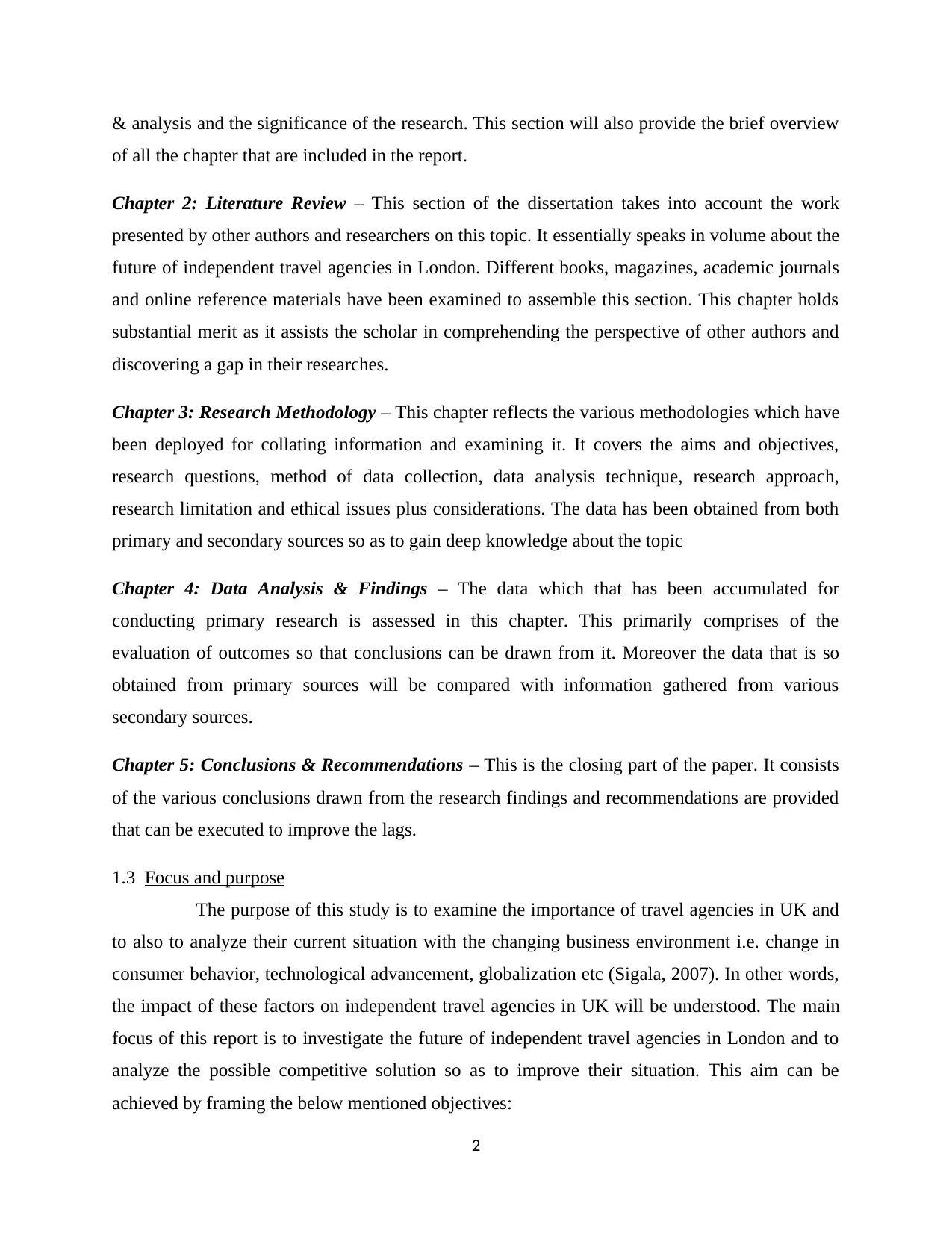
& analysis and the significance of the research. This section will also provide the brief overview
of all the chapter that are included in the report.
Chapter 2: Literature Review – This section of the dissertation takes into account the work
presented by other authors and researchers on this topic. It essentially speaks in volume about the
future of independent travel agencies in London. Different books, magazines, academic journals
and online reference materials have been examined to assemble this section. This chapter holds
substantial merit as it assists the scholar in comprehending the perspective of other authors and
discovering a gap in their researches.
Chapter 3: Research Methodology – This chapter reflects the various methodologies which have
been deployed for collating information and examining it. It covers the aims and objectives,
research questions, method of data collection, data analysis technique, research approach,
research limitation and ethical issues plus considerations. The data has been obtained from both
primary and secondary sources so as to gain deep knowledge about the topic
Chapter 4: Data Analysis & Findings – The data which that has been accumulated for
conducting primary research is assessed in this chapter. This primarily comprises of the
evaluation of outcomes so that conclusions can be drawn from it. Moreover the data that is so
obtained from primary sources will be compared with information gathered from various
secondary sources.
Chapter 5: Conclusions & Recommendations – This is the closing part of the paper. It consists
of the various conclusions drawn from the research findings and recommendations are provided
that can be executed to improve the lags.
1.3 Focus and purpose
The purpose of this study is to examine the importance of travel agencies in UK and
to also to analyze their current situation with the changing business environment i.e. change in
consumer behavior, technological advancement, globalization etc (Sigala, 2007). In other words,
the impact of these factors on independent travel agencies in UK will be understood. The main
focus of this report is to investigate the future of independent travel agencies in London and to
analyze the possible competitive solution so as to improve their situation. This aim can be
achieved by framing the below mentioned objectives:
2
of all the chapter that are included in the report.
Chapter 2: Literature Review – This section of the dissertation takes into account the work
presented by other authors and researchers on this topic. It essentially speaks in volume about the
future of independent travel agencies in London. Different books, magazines, academic journals
and online reference materials have been examined to assemble this section. This chapter holds
substantial merit as it assists the scholar in comprehending the perspective of other authors and
discovering a gap in their researches.
Chapter 3: Research Methodology – This chapter reflects the various methodologies which have
been deployed for collating information and examining it. It covers the aims and objectives,
research questions, method of data collection, data analysis technique, research approach,
research limitation and ethical issues plus considerations. The data has been obtained from both
primary and secondary sources so as to gain deep knowledge about the topic
Chapter 4: Data Analysis & Findings – The data which that has been accumulated for
conducting primary research is assessed in this chapter. This primarily comprises of the
evaluation of outcomes so that conclusions can be drawn from it. Moreover the data that is so
obtained from primary sources will be compared with information gathered from various
secondary sources.
Chapter 5: Conclusions & Recommendations – This is the closing part of the paper. It consists
of the various conclusions drawn from the research findings and recommendations are provided
that can be executed to improve the lags.
1.3 Focus and purpose
The purpose of this study is to examine the importance of travel agencies in UK and
to also to analyze their current situation with the changing business environment i.e. change in
consumer behavior, technological advancement, globalization etc (Sigala, 2007). In other words,
the impact of these factors on independent travel agencies in UK will be understood. The main
focus of this report is to investigate the future of independent travel agencies in London and to
analyze the possible competitive solution so as to improve their situation. This aim can be
achieved by framing the below mentioned objectives:
2
⊘ This is a preview!⊘
Do you want full access?
Subscribe today to unlock all pages.

Trusted by 1+ million students worldwide
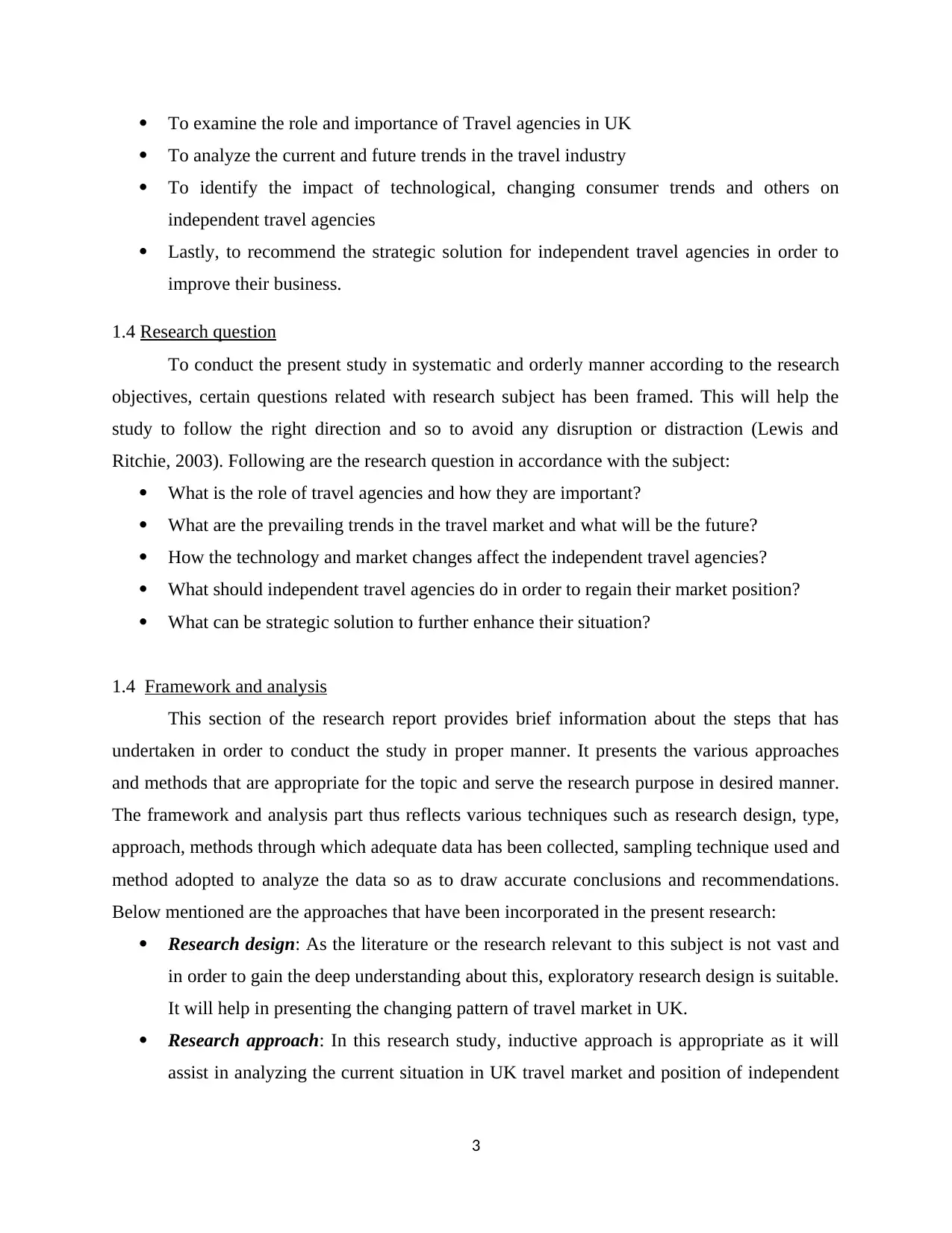
To examine the role and importance of Travel agencies in UK
To analyze the current and future trends in the travel industry
To identify the impact of technological, changing consumer trends and others on
independent travel agencies
Lastly, to recommend the strategic solution for independent travel agencies in order to
improve their business.
1.4 Research question
To conduct the present study in systematic and orderly manner according to the research
objectives, certain questions related with research subject has been framed. This will help the
study to follow the right direction and so to avoid any disruption or distraction (Lewis and
Ritchie, 2003). Following are the research question in accordance with the subject:
What is the role of travel agencies and how they are important?
What are the prevailing trends in the travel market and what will be the future?
How the technology and market changes affect the independent travel agencies?
What should independent travel agencies do in order to regain their market position?
What can be strategic solution to further enhance their situation?
1.4 Framework and analysis
This section of the research report provides brief information about the steps that has
undertaken in order to conduct the study in proper manner. It presents the various approaches
and methods that are appropriate for the topic and serve the research purpose in desired manner.
The framework and analysis part thus reflects various techniques such as research design, type,
approach, methods through which adequate data has been collected, sampling technique used and
method adopted to analyze the data so as to draw accurate conclusions and recommendations.
Below mentioned are the approaches that have been incorporated in the present research:
Research design: As the literature or the research relevant to this subject is not vast and
in order to gain the deep understanding about this, exploratory research design is suitable.
It will help in presenting the changing pattern of travel market in UK.
Research approach: In this research study, inductive approach is appropriate as it will
assist in analyzing the current situation in UK travel market and position of independent
3
To analyze the current and future trends in the travel industry
To identify the impact of technological, changing consumer trends and others on
independent travel agencies
Lastly, to recommend the strategic solution for independent travel agencies in order to
improve their business.
1.4 Research question
To conduct the present study in systematic and orderly manner according to the research
objectives, certain questions related with research subject has been framed. This will help the
study to follow the right direction and so to avoid any disruption or distraction (Lewis and
Ritchie, 2003). Following are the research question in accordance with the subject:
What is the role of travel agencies and how they are important?
What are the prevailing trends in the travel market and what will be the future?
How the technology and market changes affect the independent travel agencies?
What should independent travel agencies do in order to regain their market position?
What can be strategic solution to further enhance their situation?
1.4 Framework and analysis
This section of the research report provides brief information about the steps that has
undertaken in order to conduct the study in proper manner. It presents the various approaches
and methods that are appropriate for the topic and serve the research purpose in desired manner.
The framework and analysis part thus reflects various techniques such as research design, type,
approach, methods through which adequate data has been collected, sampling technique used and
method adopted to analyze the data so as to draw accurate conclusions and recommendations.
Below mentioned are the approaches that have been incorporated in the present research:
Research design: As the literature or the research relevant to this subject is not vast and
in order to gain the deep understanding about this, exploratory research design is suitable.
It will help in presenting the changing pattern of travel market in UK.
Research approach: In this research study, inductive approach is appropriate as it will
assist in analyzing the current situation in UK travel market and position of independent
3
Paraphrase This Document
Need a fresh take? Get an instant paraphrase of this document with our AI Paraphraser
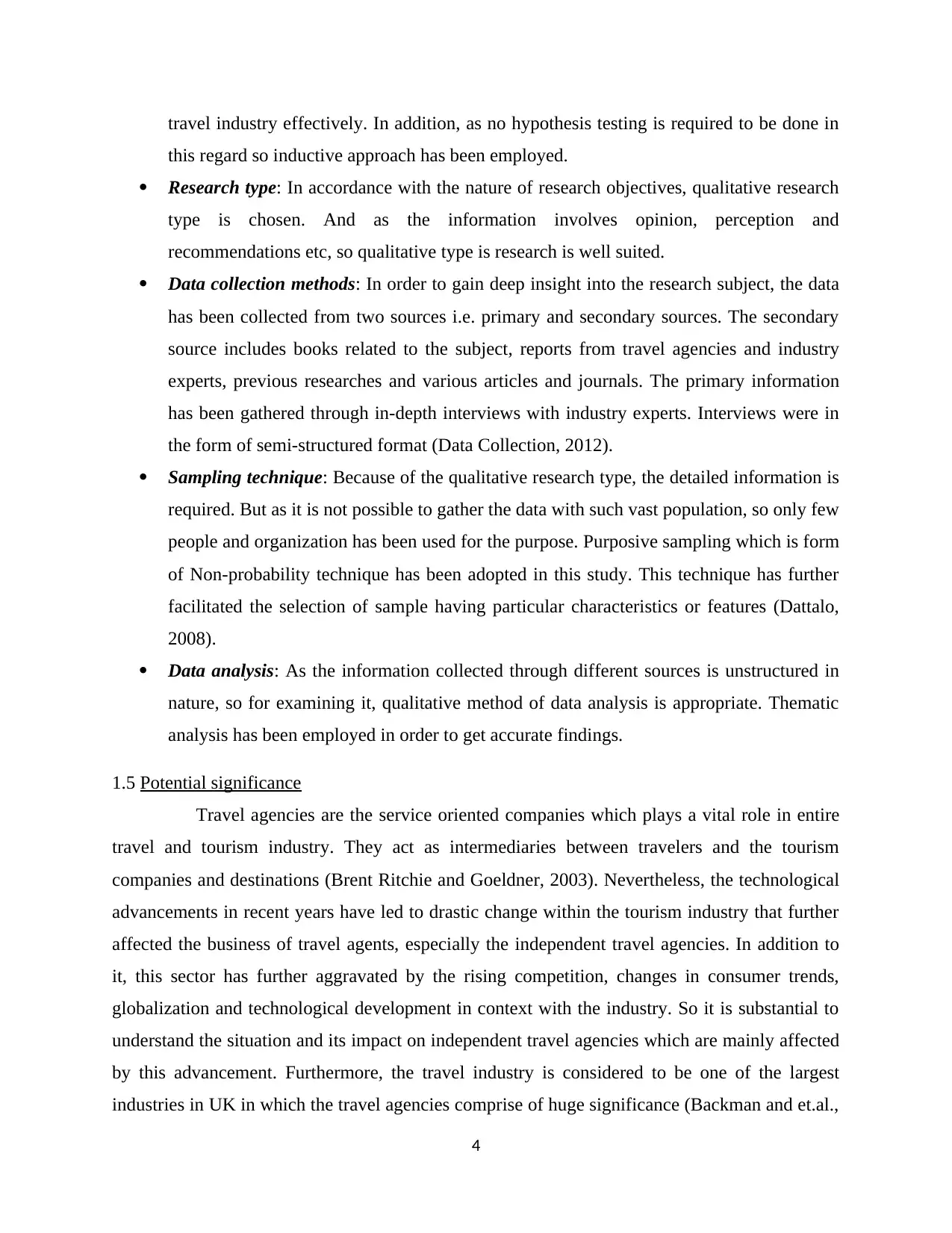
travel industry effectively. In addition, as no hypothesis testing is required to be done in
this regard so inductive approach has been employed.
Research type: In accordance with the nature of research objectives, qualitative research
type is chosen. And as the information involves opinion, perception and
recommendations etc, so qualitative type is research is well suited.
Data collection methods: In order to gain deep insight into the research subject, the data
has been collected from two sources i.e. primary and secondary sources. The secondary
source includes books related to the subject, reports from travel agencies and industry
experts, previous researches and various articles and journals. The primary information
has been gathered through in-depth interviews with industry experts. Interviews were in
the form of semi-structured format (Data Collection, 2012).
Sampling technique: Because of the qualitative research type, the detailed information is
required. But as it is not possible to gather the data with such vast population, so only few
people and organization has been used for the purpose. Purposive sampling which is form
of Non-probability technique has been adopted in this study. This technique has further
facilitated the selection of sample having particular characteristics or features (Dattalo,
2008).
Data analysis: As the information collected through different sources is unstructured in
nature, so for examining it, qualitative method of data analysis is appropriate. Thematic
analysis has been employed in order to get accurate findings.
1.5 Potential significance
Travel agencies are the service oriented companies which plays a vital role in entire
travel and tourism industry. They act as intermediaries between travelers and the tourism
companies and destinations (Brent Ritchie and Goeldner, 2003). Nevertheless, the technological
advancements in recent years have led to drastic change within the tourism industry that further
affected the business of travel agents, especially the independent travel agencies. In addition to
it, this sector has further aggravated by the rising competition, changes in consumer trends,
globalization and technological development in context with the industry. So it is substantial to
understand the situation and its impact on independent travel agencies which are mainly affected
by this advancement. Furthermore, the travel industry is considered to be one of the largest
industries in UK in which the travel agencies comprise of huge significance (Backman and et.al.,
4
this regard so inductive approach has been employed.
Research type: In accordance with the nature of research objectives, qualitative research
type is chosen. And as the information involves opinion, perception and
recommendations etc, so qualitative type is research is well suited.
Data collection methods: In order to gain deep insight into the research subject, the data
has been collected from two sources i.e. primary and secondary sources. The secondary
source includes books related to the subject, reports from travel agencies and industry
experts, previous researches and various articles and journals. The primary information
has been gathered through in-depth interviews with industry experts. Interviews were in
the form of semi-structured format (Data Collection, 2012).
Sampling technique: Because of the qualitative research type, the detailed information is
required. But as it is not possible to gather the data with such vast population, so only few
people and organization has been used for the purpose. Purposive sampling which is form
of Non-probability technique has been adopted in this study. This technique has further
facilitated the selection of sample having particular characteristics or features (Dattalo,
2008).
Data analysis: As the information collected through different sources is unstructured in
nature, so for examining it, qualitative method of data analysis is appropriate. Thematic
analysis has been employed in order to get accurate findings.
1.5 Potential significance
Travel agencies are the service oriented companies which plays a vital role in entire
travel and tourism industry. They act as intermediaries between travelers and the tourism
companies and destinations (Brent Ritchie and Goeldner, 2003). Nevertheless, the technological
advancements in recent years have led to drastic change within the tourism industry that further
affected the business of travel agents, especially the independent travel agencies. In addition to
it, this sector has further aggravated by the rising competition, changes in consumer trends,
globalization and technological development in context with the industry. So it is substantial to
understand the situation and its impact on independent travel agencies which are mainly affected
by this advancement. Furthermore, the travel industry is considered to be one of the largest
industries in UK in which the travel agencies comprise of huge significance (Backman and et.al.,
4
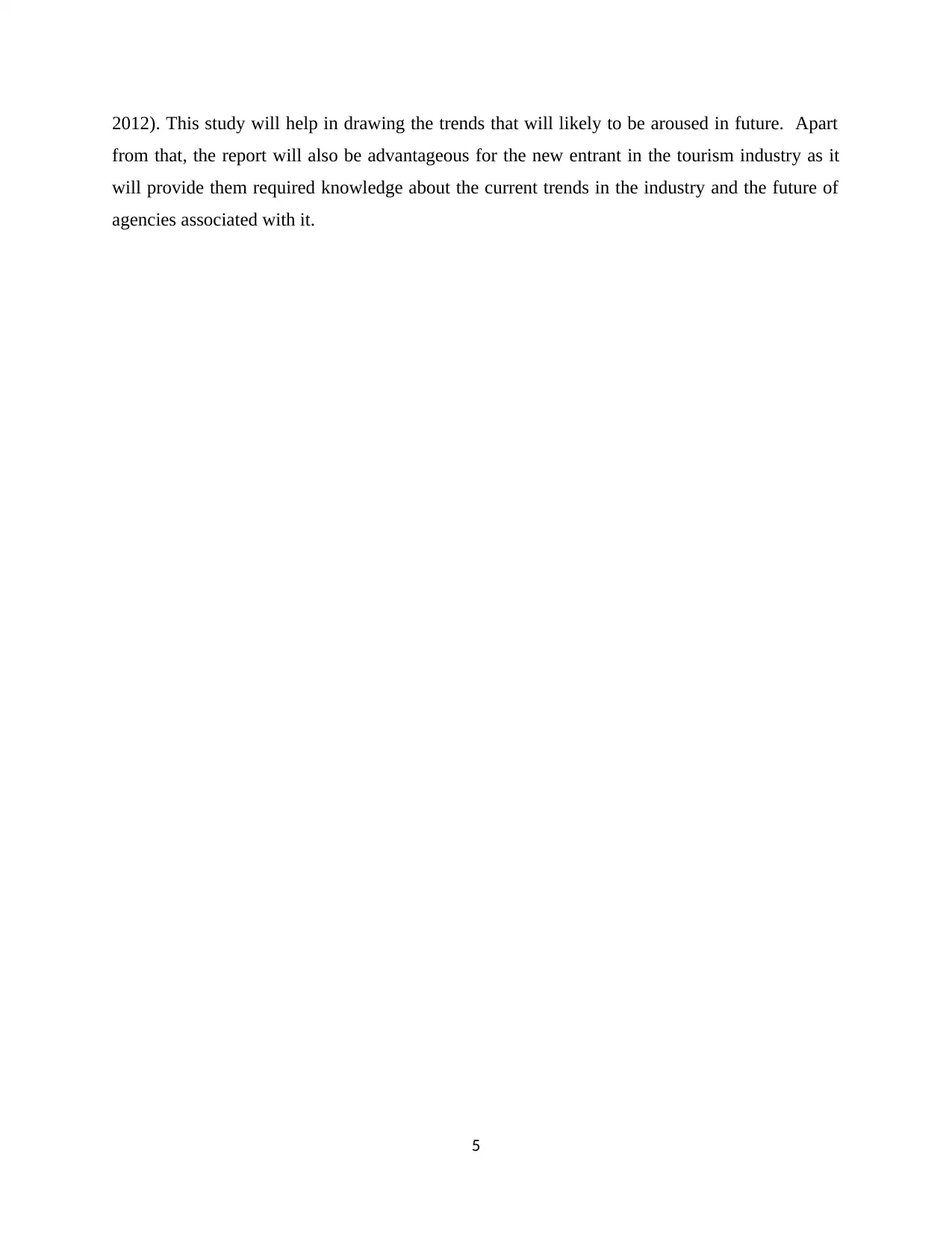
2012). This study will help in drawing the trends that will likely to be aroused in future. Apart
from that, the report will also be advantageous for the new entrant in the tourism industry as it
will provide them required knowledge about the current trends in the industry and the future of
agencies associated with it.
5
from that, the report will also be advantageous for the new entrant in the tourism industry as it
will provide them required knowledge about the current trends in the industry and the future of
agencies associated with it.
5
⊘ This is a preview!⊘
Do you want full access?
Subscribe today to unlock all pages.

Trusted by 1+ million students worldwide
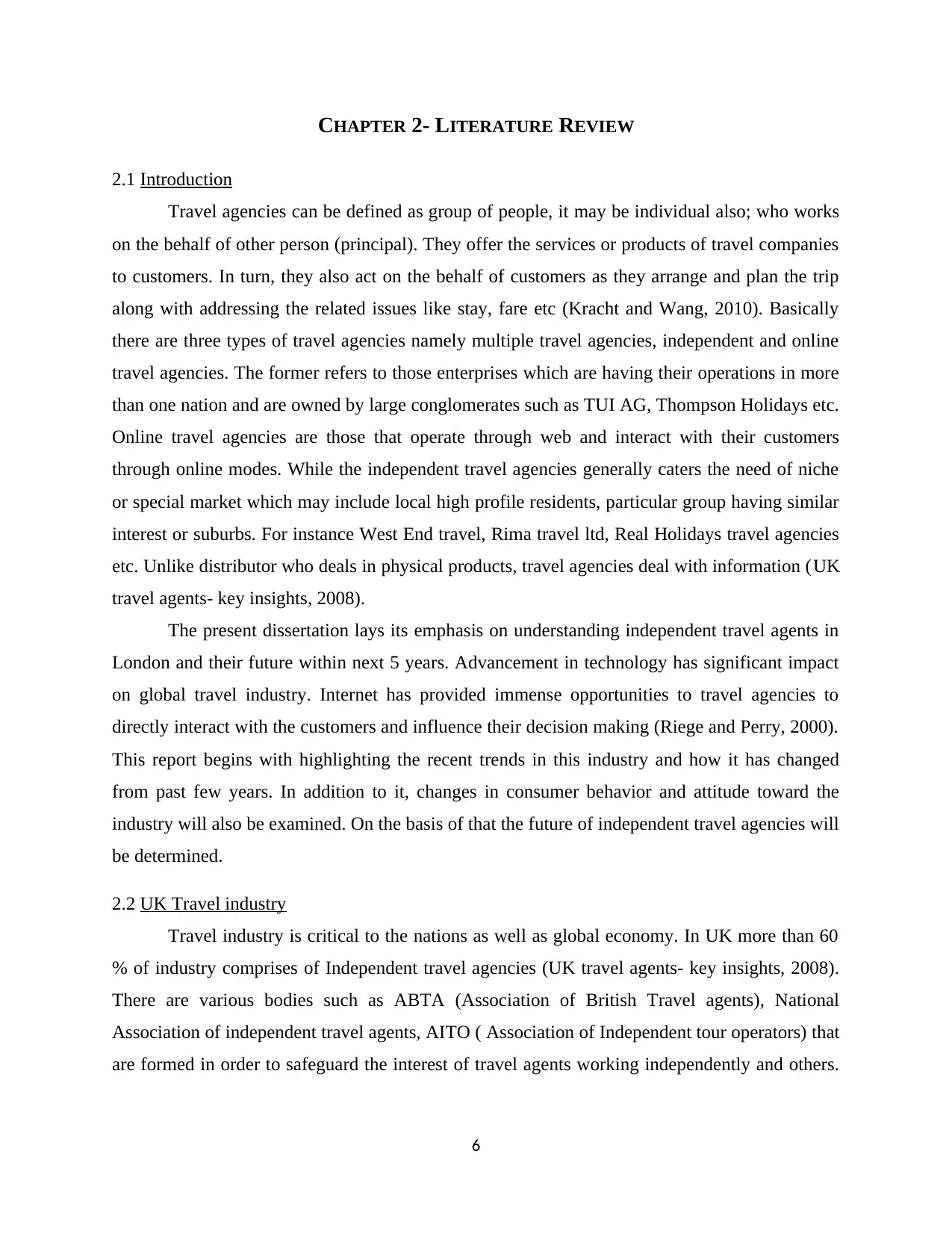
CHAPTER 2- LITERATURE REVIEW
2.1 Introduction
Travel agencies can be defined as group of people, it may be individual also; who works
on the behalf of other person (principal). They offer the services or products of travel companies
to customers. In turn, they also act on the behalf of customers as they arrange and plan the trip
along with addressing the related issues like stay, fare etc (Kracht and Wang, 2010). Basically
there are three types of travel agencies namely multiple travel agencies, independent and online
travel agencies. The former refers to those enterprises which are having their operations in more
than one nation and are owned by large conglomerates such as TUI AG, Thompson Holidays etc.
Online travel agencies are those that operate through web and interact with their customers
through online modes. While the independent travel agencies generally caters the need of niche
or special market which may include local high profile residents, particular group having similar
interest or suburbs. For instance West End travel, Rima travel ltd, Real Holidays travel agencies
etc. Unlike distributor who deals in physical products, travel agencies deal with information (UK
travel agents- key insights, 2008).
The present dissertation lays its emphasis on understanding independent travel agents in
London and their future within next 5 years. Advancement in technology has significant impact
on global travel industry. Internet has provided immense opportunities to travel agencies to
directly interact with the customers and influence their decision making (Riege and Perry, 2000).
This report begins with highlighting the recent trends in this industry and how it has changed
from past few years. In addition to it, changes in consumer behavior and attitude toward the
industry will also be examined. On the basis of that the future of independent travel agencies will
be determined.
2.2 UK Travel industry
Travel industry is critical to the nations as well as global economy. In UK more than 60
% of industry comprises of Independent travel agencies (UK travel agents- key insights, 2008).
There are various bodies such as ABTA (Association of British Travel agents), National
Association of independent travel agents, AITO ( Association of Independent tour operators) that
are formed in order to safeguard the interest of travel agents working independently and others.
6
2.1 Introduction
Travel agencies can be defined as group of people, it may be individual also; who works
on the behalf of other person (principal). They offer the services or products of travel companies
to customers. In turn, they also act on the behalf of customers as they arrange and plan the trip
along with addressing the related issues like stay, fare etc (Kracht and Wang, 2010). Basically
there are three types of travel agencies namely multiple travel agencies, independent and online
travel agencies. The former refers to those enterprises which are having their operations in more
than one nation and are owned by large conglomerates such as TUI AG, Thompson Holidays etc.
Online travel agencies are those that operate through web and interact with their customers
through online modes. While the independent travel agencies generally caters the need of niche
or special market which may include local high profile residents, particular group having similar
interest or suburbs. For instance West End travel, Rima travel ltd, Real Holidays travel agencies
etc. Unlike distributor who deals in physical products, travel agencies deal with information (UK
travel agents- key insights, 2008).
The present dissertation lays its emphasis on understanding independent travel agents in
London and their future within next 5 years. Advancement in technology has significant impact
on global travel industry. Internet has provided immense opportunities to travel agencies to
directly interact with the customers and influence their decision making (Riege and Perry, 2000).
This report begins with highlighting the recent trends in this industry and how it has changed
from past few years. In addition to it, changes in consumer behavior and attitude toward the
industry will also be examined. On the basis of that the future of independent travel agencies will
be determined.
2.2 UK Travel industry
Travel industry is critical to the nations as well as global economy. In UK more than 60
% of industry comprises of Independent travel agencies (UK travel agents- key insights, 2008).
There are various bodies such as ABTA (Association of British Travel agents), National
Association of independent travel agents, AITO ( Association of Independent tour operators) that
are formed in order to safeguard the interest of travel agents working independently and others.
6
Paraphrase This Document
Need a fresh take? Get an instant paraphrase of this document with our AI Paraphraser
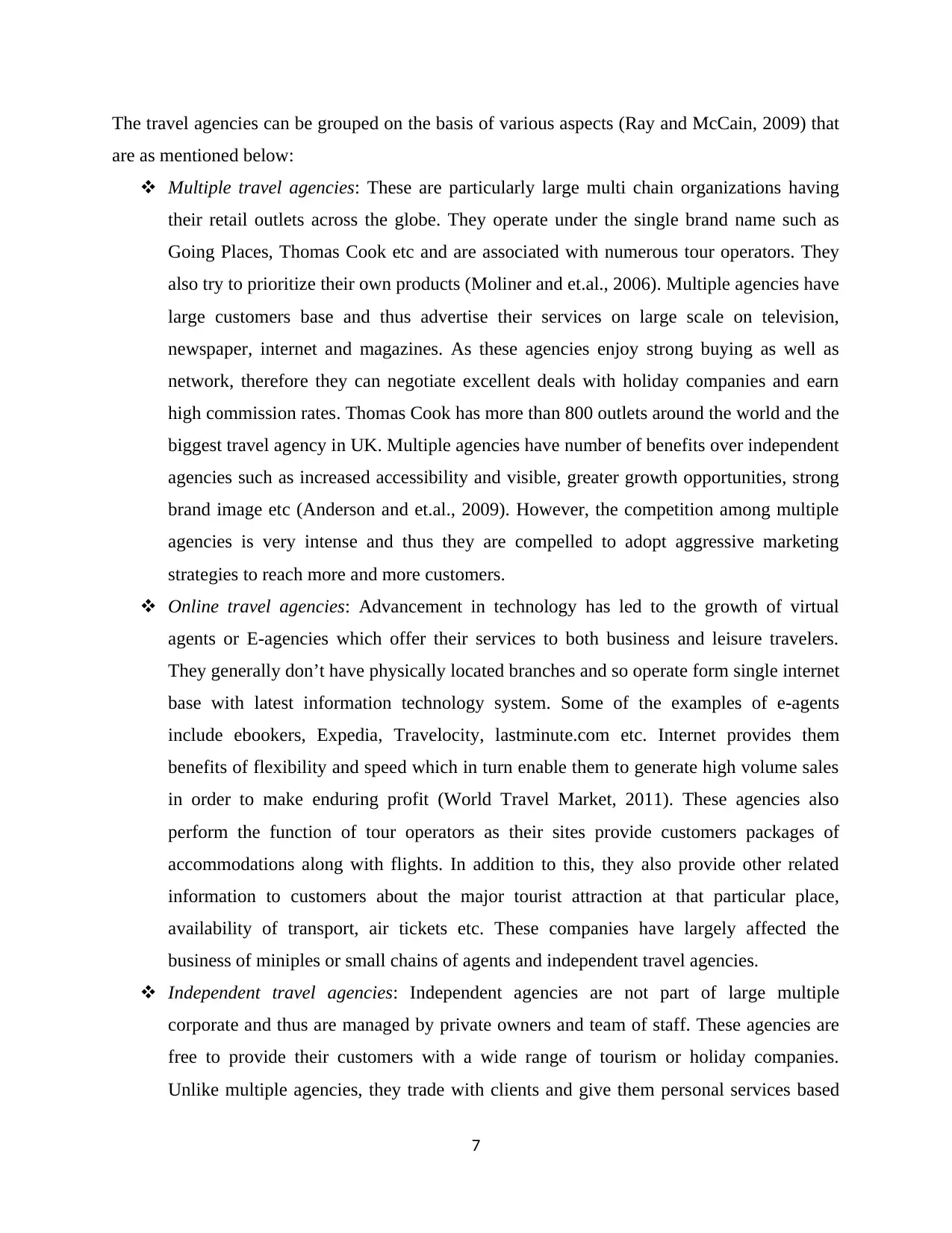
The travel agencies can be grouped on the basis of various aspects (Ray and McCain, 2009) that
are as mentioned below:
Multiple travel agencies: These are particularly large multi chain organizations having
their retail outlets across the globe. They operate under the single brand name such as
Going Places, Thomas Cook etc and are associated with numerous tour operators. They
also try to prioritize their own products (Moliner and et.al., 2006). Multiple agencies have
large customers base and thus advertise their services on large scale on television,
newspaper, internet and magazines. As these agencies enjoy strong buying as well as
network, therefore they can negotiate excellent deals with holiday companies and earn
high commission rates. Thomas Cook has more than 800 outlets around the world and the
biggest travel agency in UK. Multiple agencies have number of benefits over independent
agencies such as increased accessibility and visible, greater growth opportunities, strong
brand image etc (Anderson and et.al., 2009). However, the competition among multiple
agencies is very intense and thus they are compelled to adopt aggressive marketing
strategies to reach more and more customers.
Online travel agencies: Advancement in technology has led to the growth of virtual
agents or E-agencies which offer their services to both business and leisure travelers.
They generally don’t have physically located branches and so operate form single internet
base with latest information technology system. Some of the examples of e-agents
include ebookers, Expedia, Travelocity, lastminute.com etc. Internet provides them
benefits of flexibility and speed which in turn enable them to generate high volume sales
in order to make enduring profit (World Travel Market, 2011). These agencies also
perform the function of tour operators as their sites provide customers packages of
accommodations along with flights. In addition to this, they also provide other related
information to customers about the major tourist attraction at that particular place,
availability of transport, air tickets etc. These companies have largely affected the
business of miniples or small chains of agents and independent travel agencies.
Independent travel agencies: Independent agencies are not part of large multiple
corporate and thus are managed by private owners and team of staff. These agencies are
free to provide their customers with a wide range of tourism or holiday companies.
Unlike multiple agencies, they trade with clients and give them personal services based
7
are as mentioned below:
Multiple travel agencies: These are particularly large multi chain organizations having
their retail outlets across the globe. They operate under the single brand name such as
Going Places, Thomas Cook etc and are associated with numerous tour operators. They
also try to prioritize their own products (Moliner and et.al., 2006). Multiple agencies have
large customers base and thus advertise their services on large scale on television,
newspaper, internet and magazines. As these agencies enjoy strong buying as well as
network, therefore they can negotiate excellent deals with holiday companies and earn
high commission rates. Thomas Cook has more than 800 outlets around the world and the
biggest travel agency in UK. Multiple agencies have number of benefits over independent
agencies such as increased accessibility and visible, greater growth opportunities, strong
brand image etc (Anderson and et.al., 2009). However, the competition among multiple
agencies is very intense and thus they are compelled to adopt aggressive marketing
strategies to reach more and more customers.
Online travel agencies: Advancement in technology has led to the growth of virtual
agents or E-agencies which offer their services to both business and leisure travelers.
They generally don’t have physically located branches and so operate form single internet
base with latest information technology system. Some of the examples of e-agents
include ebookers, Expedia, Travelocity, lastminute.com etc. Internet provides them
benefits of flexibility and speed which in turn enable them to generate high volume sales
in order to make enduring profit (World Travel Market, 2011). These agencies also
perform the function of tour operators as their sites provide customers packages of
accommodations along with flights. In addition to this, they also provide other related
information to customers about the major tourist attraction at that particular place,
availability of transport, air tickets etc. These companies have largely affected the
business of miniples or small chains of agents and independent travel agencies.
Independent travel agencies: Independent agencies are not part of large multiple
corporate and thus are managed by private owners and team of staff. These agencies are
free to provide their customers with a wide range of tourism or holiday companies.
Unlike multiple agencies, they trade with clients and give them personal services based
7
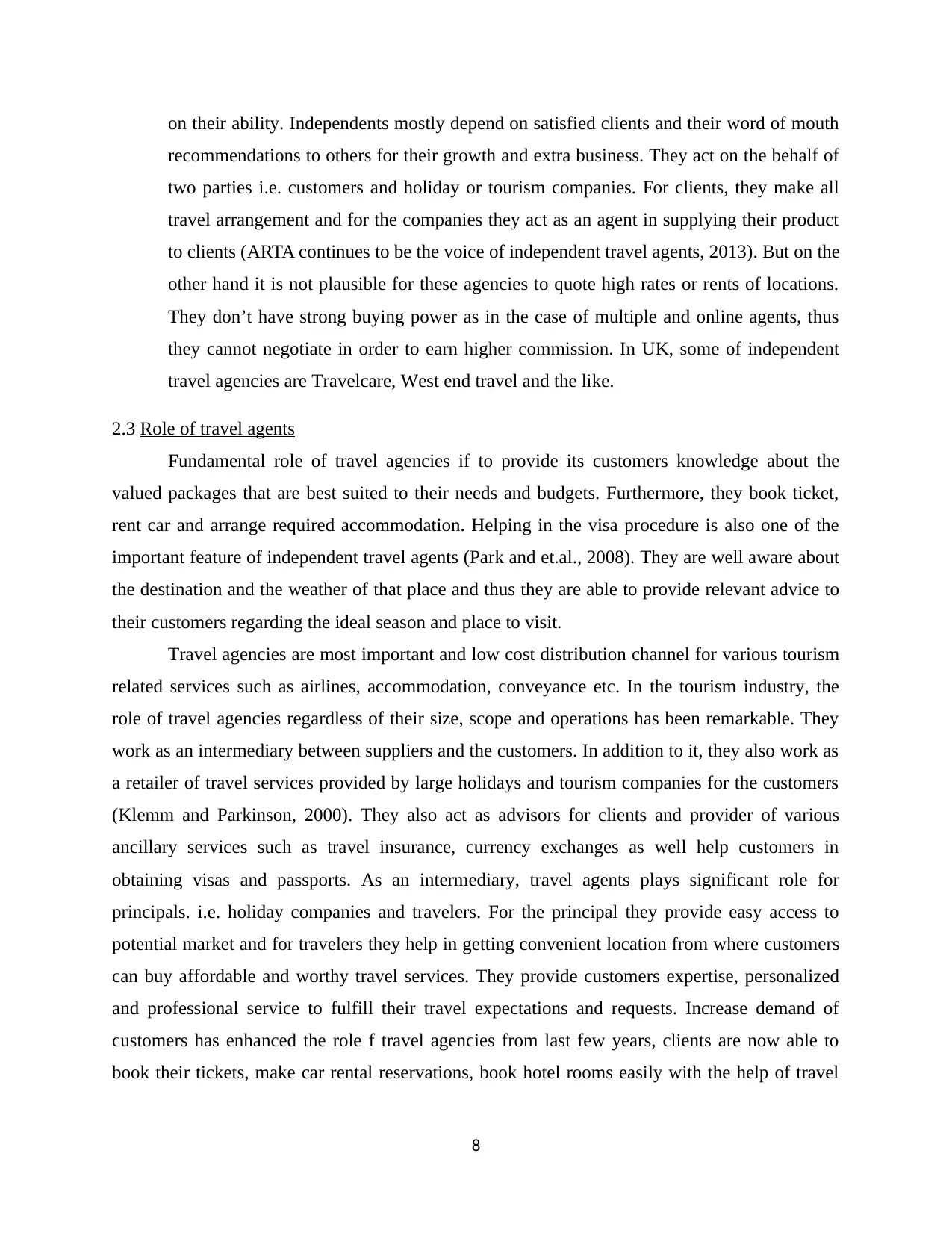
on their ability. Independents mostly depend on satisfied clients and their word of mouth
recommendations to others for their growth and extra business. They act on the behalf of
two parties i.e. customers and holiday or tourism companies. For clients, they make all
travel arrangement and for the companies they act as an agent in supplying their product
to clients (ARTA continues to be the voice of independent travel agents, 2013). But on the
other hand it is not plausible for these agencies to quote high rates or rents of locations.
They don’t have strong buying power as in the case of multiple and online agents, thus
they cannot negotiate in order to earn higher commission. In UK, some of independent
travel agencies are Travelcare, West end travel and the like.
2.3 Role of travel agents
Fundamental role of travel agencies if to provide its customers knowledge about the
valued packages that are best suited to their needs and budgets. Furthermore, they book ticket,
rent car and arrange required accommodation. Helping in the visa procedure is also one of the
important feature of independent travel agents (Park and et.al., 2008). They are well aware about
the destination and the weather of that place and thus they are able to provide relevant advice to
their customers regarding the ideal season and place to visit.
Travel agencies are most important and low cost distribution channel for various tourism
related services such as airlines, accommodation, conveyance etc. In the tourism industry, the
role of travel agencies regardless of their size, scope and operations has been remarkable. They
work as an intermediary between suppliers and the customers. In addition to it, they also work as
a retailer of travel services provided by large holidays and tourism companies for the customers
(Klemm and Parkinson, 2000). They also act as advisors for clients and provider of various
ancillary services such as travel insurance, currency exchanges as well help customers in
obtaining visas and passports. As an intermediary, travel agents plays significant role for
principals. i.e. holiday companies and travelers. For the principal they provide easy access to
potential market and for travelers they help in getting convenient location from where customers
can buy affordable and worthy travel services. They provide customers expertise, personalized
and professional service to fulfill their travel expectations and requests. Increase demand of
customers has enhanced the role f travel agencies from last few years, clients are now able to
book their tickets, make car rental reservations, book hotel rooms easily with the help of travel
8
recommendations to others for their growth and extra business. They act on the behalf of
two parties i.e. customers and holiday or tourism companies. For clients, they make all
travel arrangement and for the companies they act as an agent in supplying their product
to clients (ARTA continues to be the voice of independent travel agents, 2013). But on the
other hand it is not plausible for these agencies to quote high rates or rents of locations.
They don’t have strong buying power as in the case of multiple and online agents, thus
they cannot negotiate in order to earn higher commission. In UK, some of independent
travel agencies are Travelcare, West end travel and the like.
2.3 Role of travel agents
Fundamental role of travel agencies if to provide its customers knowledge about the
valued packages that are best suited to their needs and budgets. Furthermore, they book ticket,
rent car and arrange required accommodation. Helping in the visa procedure is also one of the
important feature of independent travel agents (Park and et.al., 2008). They are well aware about
the destination and the weather of that place and thus they are able to provide relevant advice to
their customers regarding the ideal season and place to visit.
Travel agencies are most important and low cost distribution channel for various tourism
related services such as airlines, accommodation, conveyance etc. In the tourism industry, the
role of travel agencies regardless of their size, scope and operations has been remarkable. They
work as an intermediary between suppliers and the customers. In addition to it, they also work as
a retailer of travel services provided by large holidays and tourism companies for the customers
(Klemm and Parkinson, 2000). They also act as advisors for clients and provider of various
ancillary services such as travel insurance, currency exchanges as well help customers in
obtaining visas and passports. As an intermediary, travel agents plays significant role for
principals. i.e. holiday companies and travelers. For the principal they provide easy access to
potential market and for travelers they help in getting convenient location from where customers
can buy affordable and worthy travel services. They provide customers expertise, personalized
and professional service to fulfill their travel expectations and requests. Increase demand of
customers has enhanced the role f travel agencies from last few years, clients are now able to
book their tickets, make car rental reservations, book hotel rooms easily with the help of travel
8
⊘ This is a preview!⊘
Do you want full access?
Subscribe today to unlock all pages.

Trusted by 1+ million students worldwide
1 out of 27
Related Documents
Your All-in-One AI-Powered Toolkit for Academic Success.
+13062052269
info@desklib.com
Available 24*7 on WhatsApp / Email
![[object Object]](/_next/static/media/star-bottom.7253800d.svg)
Unlock your academic potential
Copyright © 2020–2026 A2Z Services. All Rights Reserved. Developed and managed by ZUCOL.





